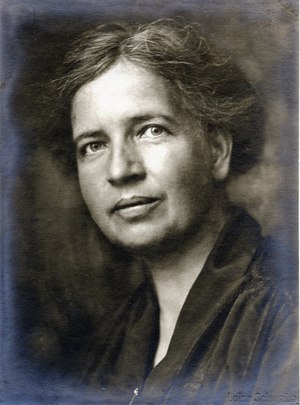
Unternavigation
Maria Fierz
Together with Mentona Moser and Marta von Meyenburg, Maria Fierz was an early exponent of, and specialized in, social work. She managed the Women’s Centre (Frauenzentrale) in Zurich for decades; she was committed to pursuing liberal and social policies, and worked to advance the rights of women.
Maria Fierz (1878-1956) grew up in a wealthy family in Zurich. Her grandfather Heinrich Fierz (1813-1877), a textile manufacturer and financier, was a National Councillor representing the Liberal Party. Her father, Carl Fierz (1852-1892), bequeathed Schloss Schwandegg to the city of Zurich so it could house the Swiss National Museum. As her parents refused to allow her to study, Maria Fierz travelled to London, at the suggestion of Mentona Moser, in order to train as a social worker (from 1901 to 1903) at the Women’s University Settlement. The social workers of the settlement movement ran support and advice centres in the poorer, working-class districts. In doing so, they went further than the home visits to the needy that were common at the time.
After completing her training, Fierz returned to Zurich with Moser. Together they became involved in the Women’s Charitable Association, seeking opportunities at the same time to disseminate the methods they learned in Great Britain throughout Switzerland. They initiated and conducted courses to introduce ‘women’s charitable work for social tasks’ in Zurich. In the settlement movement, the training focused both on providing care services and on helping people develop the ability to help themselves. Since the provision of public social care services was only weakly developed in Zurich, what assistance or support that could be given had to take place in care homes and institutions. Aside from her work in training others in social welfare work, Maria Fierz also completed an internship at the volunteer-run organisation providing poor relief to city of Zürich residents in need; there she learned the administrative side of providing welfare services.
Fierz then resumed the courses for women wishing to engage in charitable work with Moser’s successor, Marta von Meyenburg in 1910. Together, they expanded the educational offerings, and eventually founded the Zurich Social Women’s School (Soziale Frauenschule) in 1920, where Fierz served as a member of the board until 1948. The school’s courses were initially attended by women who worked in social care contexts on a voluntary, unpaid basis. Increasingly, the women who joined this first group of students wanted to use the courses as preparation for careers in socially-orientated professions. The early courses and the school therefore played a key role in the professionalisation of what came to be called ‘social work’, as well as in the emergence of female field of work populated by qualified specialists.
In addition to social work, Maria Fierz involved in numerous socio-political issues. In 1908, she was appointed the first, and only, woman in both the central and supervisory boards of the volunteer-run Zürich poor relief organisation, though she left it in 1913 due to differences of opinion. However, starting in 1928, she served in its successor organisation, the Poor Relief Commission for the City of Zurich. From 1917 to 1944, she managed the Frauenzentralein Zurich, which was housed in the same building as the Social Women’s School; its goal was to contribute to the public good as well as to develop new areas in which middle-class women could work. The Frauenzentrale coordinated the activities of women’s social care organisations, offered counselling for women, and ran a school for mothers (1942-1977). Fierz was also a board member of the Federation of Swiss Women’s Associations from 1935 to 1940. Due to her long commitment to promoting women’s occupations as well as women’s equality, she was one of the more important figures in the Swiss women’s emancipation movement.
Her political engagement, following the 1918 national strike, including launching the ‘Women’s Groups for Social Understanding’. Middle and working-class women gathered in Zurich’s city districts and worked to find commonalities which transcended their class. With the rise of Nazi-oriented ‘Frontist’ movements and parties in the 1930s, Fierz became politically active again and campaigned in the nationwide ‘Working Group for Women and Democracy’ (1933) which strongly opposed these antidemocratic and fascist currents
Literatur / Bibliographie / Bibliografia / References: Matter Sonja (2011), Der Armut auf den Leib rücken: Die Professionalisierung der Sozialen Arbeit in der Schweiz (1900–1960), Zürich ; Ruckstuhl Brigitte, Ryter Elisabeth (2014), Beraten, Bewegen, Bewirken: Zürcher Frauenzentrale 1914-2014, Zürich.
(12/2018)




